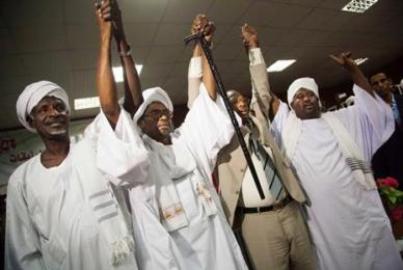South Darfur holds its last tribal reconciliation conference
June 18, 2016 (NYALA) – The Governor of South Darfur Adam al-Faki Saturday expressed hopes that the signing of a reconciliation agreement between Rizeigat and Habbaniya ends the tribal conflicts in his state.

The restoration of security “will pave the way for the launch of sustainable development in the state”, al Faki further said adding that the East Darfur and South Darfur states will conjugate their efforts to fight crimes and bring the culprits to justice.
Al-Faki has also urged the security committees in the two states to hold intensive joint meetings to fill any gap that could lead to eruption of inter-tribal clashes in the future.
Also he pointed out that a joint mechanism has been formed to ensure full implementation of the reconciliation agreement.
In a briefing to the UN Security Council on 14 June, UN Peacekeeping Chief Herve Ladsous said the tribal violence that emanating from disputes over access to land, water and grazing areas remain a major cause of insecurity in Darfur.
“This inter communal violence has also been exacerbated by the politicization of disputes, the arming of communities, inadequate efforts to restore the rule of law, and the recurring impunity of perpetrators of violence,” he said.
He further pointed to the efforts undertaken by the local authorities to curb violence adding “however, the violence persists as its underlying causes, which are inherently linked to those of the broader Darfur conflict, are yet to be addressed”.
On his part, the acting East Darfur Governor Mohamed Hassan has lauded the spirit of tolerance of both tribes to lay down pillars of peace and stability.
“The role of the Native Administration ended up with signing the reconciliation document, so the facilitating the implementation of the document rests on the governments of the two states,” he added.
In the same context, the leader of Habbaniya tribe said the conflict with the Rizeigat is completely over, describing the reconciliation conference as a new chapter for the two sides.
“Those who disturb the good relations between the two tribes are thieves and robbers,” he said.
Meanwhile, he has called on both state governments to put an end to the insecurity acts.
The reconciliation conference has come out with a number of recommendations that include arresting all outlaws and handing them over to the police and establishing joint tribal committees to follow up the implementation of the outcome of the conference.
Also, the conference recommended increasing the number of police stations in the state, besides deployment of buffer forces in the areas of the warring tribes to prevent any possible clashes in the future.
Furthermore, the document has recommended disseminating culture of
peace and accepting the others.
The South Darfur is one of the most states in Darfur that witness inter-tribal conflicts a matter that created state of displacement mostly among children and women and arson attacks on villages.
(ST)
